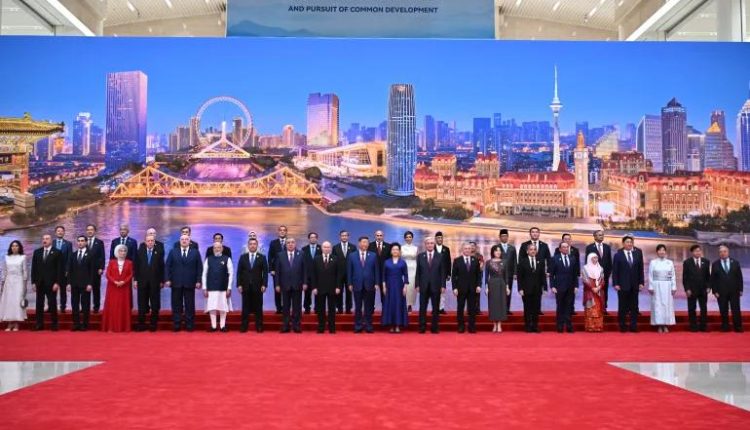TIANJIN SUMMIT: A STRATEGIC VISION FOR GLOBAL CHANGES
Exclusive – “Aldonya News”
By General Monzer Al Ayoubi

Translation: Dr Pierre A. Sarkis
Against the backdrop of escalating global conflicts and at a critical juncture in the history of international relations and politics, the 25th Shanghai Cooperation Organization (SCO) Summit was convened in Tianjin from 31 August-1 September. The spectacle that brought together the leaders of China, Russia and Indiarepresents an emerging challenge to US global leadership. The summit was not just a routine meeting, but a tacit announcement that the world has entered a new multipolar order in which the East and West compete at the forefront of international decision-making. India’s accession to the organization has undoubtedly increased the latter’s size and influence, as it now includes 10 countries representing almost half of the world’s population. This is besides the 16 non-member countries which are observers or candidates to become partners.
Subsequently, the summit expressed a strategic shift from a political-security forum to an integrated institutional framework, by reading the broader key steps and objectives as announced, which include:
1- Building a common force with independent alliances capable of exerting influence beyond Western hegemony.
2- Unifying the membership of the organization and strengthening internal cohesion to avoid regional rifts.
3- Establishing the basis for collective security cooperation, including counterterrorism and cross-border crimes, as part of the strategy to secure vital interests of SCO members.
In this context, the focus has been on collective security by encouraging coordination among memberstates and enhancing mutual trust, to address common security challenges and ensure stability. These goals reflect a strategic vision that cannot be ignored andincludes reducing dependence on the West in such fields as financial transactions, energy and the economy, with the ambition to use technological and military development as a strategic tool of power, to ensure the sustainability of influence in the future. This is in addition to establishing a unified standard for security and cyber cooperation within the SCO’s space. In parallel, clear signals were sent to Arab Countries to encourage and call on them to reposition themselves away from the traditional Western dualism, with the possibility of developing alternative economic and energy projects. This geopolitical and economic positioning means establishing end-point pillars that strengthen and enhance member autonomy and limit US hegemony.
In a tentative symbolic reading between the image and the scene, the former refers to a visual or mental representation of something, as an effective means of communication to express feelings and ideas, which is characterized by the ability to directly affect the consciousness of the recipient. While the scene is an integrated narrative unit with its temporal and spatial dimensions, the “scene image” is often embodied as a means of narrating events and sensory details, whichgives it a special power in influencing the mind and conscience, to become an essential element in contemporary political or cultural discourse.
From the perspective of a dramatic play, the famous image that brought together Chinese President Xi Jinping, his Russian counterpart Vladimir Putin, and Indian leader Narendra Modi constituted a message that dominates the mind of US President Donald Trump, to be the suggestive scene in the overall picture of the heads of states participating in the 28-nation summit. It pinpoints that the world order can no longer be managed unilaterally, and that SCO sets new standards and rules for international cooperation that reflect the growing interests of its members and limit the unilateral influence of the West.
From these standpoints, President Trump did not delay in translating the immediate impact of the sweeping spectacle, declaring on his Social Truth page, “happy and long holiday to the Chinese President and to the wonderful Chinese people, and warmest congratulations to the Russian President and North Korean leader, accusing the three politicians of “conspiring against the United States.”
Stanislav Tkachenko, a professor at the Department of European Studies at the University of St. Petersburg, commented that Trump’s statement about a “conspiracy” is the result of his conviction “of his country’s declining influence in Eurasia, and his displeasure at not being invited to attend the Chinese military parade”, which automatically throws the United States on the Eurasian sidelines, and perhaps also meant that the Eurasian partners strengthen their relations not only in the service of their country’s interests, but also in order to “poke” Washington and embarrass the American President personally, politically and domestically.
Between ambition and reality, the SCO Summit confirmed that the horizon of Western influence has become limited, and that the era of unipolarity has come to an end, imposing itself a multidimensional global monopole regarding economy, security, and technology. The success of this vision and path depends on the consensus and unity of goals among its members first, and its ability to face global pressures second. This can only be achieved through building strong and sustainable institutions that bear the challenges of the twenty-first century.
*Scholar in Security and Strategic Affairs


